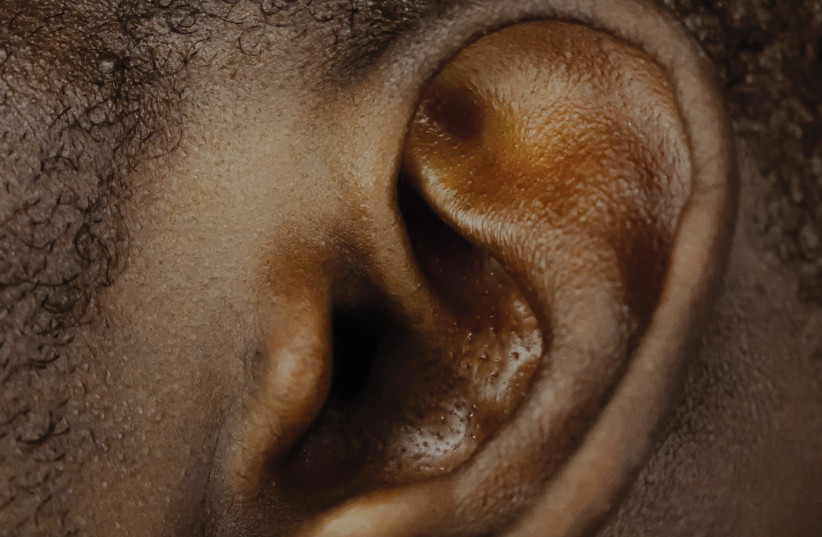Because of frequent references to lashon hara (derogatory speech) in liturgy, Tanach, Talmud and other sources, too, one could be forgiven for believing that Judaism is obsessed with the all-too-common phenomenon of people speaking ill of others.
For example, toward the end of the thrice-daily recitation of the Amidah (standing prayer) we are implored to “guard our tongue from evil and our lips from deceitful speech”. In addition, several of the weekly Torah readings deal with content pertinent to the topic of lashon hara.
“When the cloud had departed from the Tent, Miriam was as leprous as snow...”
Numbers 12:10
For example, in Parashat Beha’alotecha, we read, “When the cloud had departed from the Tent, Miriam was as leprous as snow...” (Numbers, 12:10). Miriam was afflicted with tzara’at, a leprosy-like skin condition, because she spoke negatively about her brother, Moses. And on Yom Kippur, when we are required to confess our sins, 10 of the 44 confessional phrases are connected to speech. One of these 10 refers to the sin of rechilut (gossip) and another to lashon hara.
In Parashat Kedoshim, the Torah prohibits us from engaging in rechilut, from “going about as a talebearer among people” (Leviticus, 19:16). And as for lashon hara, the Talmud regards it as among the worst of all interpersonal sins (Bava Metzia, 58b).
The human tendency to make negative comments about others and, indeed, to listen to them when proffered, is humorously captured in the quip attributed to Alice Roosevelt Longworth, “If you haven’t got anything good to say about anyone, come and sit by me.” This quip belies the seriousness with which negative speech is viewed in society at large and in Judaism.
While some may see prohibitions against gossip and negative speech as a constraint on free speech, freedom of speech is not an absolute right. For example, in the secular world, there are laws against incitement and defamation. However, in contrast to defamation laws which are concerned with untruths, lashon hara refers to speaking negatively about another person where the comments made can include ones which are believed to be true (Kitzur Shulchan Aruch, 30:2; Maimonides’ Hilchot Deot, Chapter 7:2).
Why is Judaism so concerned about such behavior: saying negative things about another person? And as for negative truths, surely there can be nothing wrong in telling the truth! The reason is that other considerations are at play. Judaism’s concern with lashon hara stems from the very real harms it may cause. Unlike theft and cheating, for example, which can be compensated for financially, harm resulting from lashon hara can be irreparable. What can occur?
Lashon hara and the victim
Lashon hara may sharply compromise the quality of the victim’s life through serving to shame or humiliate him, thereby causing reputational damage – lowering him in the esteem he had hitherto been held by others. This may, in turn, precipitate deep depression or worse. Lashon hara can have these effects because keter shem tov (the crown of a good name) is very important to most people because they care greatly about how others see them.
According to Ecclesiastes, “A good name is better than precious oil” (7:1). As the renowned Australian philosopher Raimond Gaita pointed out in his 2004 Quarterly Essay, good human lives are lived in the enjoyment of the deserved esteem of the members of one’s community. And yet, as King Solomon observed, “All the good deeds we may perform can be negated with just a slip of the tongue.” Reputational damage, then, greatly undermines the victim’s quality of life.
The development and preservation of a positive reputation is an ongoing life project for many people, or at least it is for those who have sought to lead an examined life. Its importance is noted by Rabbi Samson Raphael Hirsch in his commentary on Parashat Noach. This parasha’s opening words are, “These are the toldot of Noah” (Genesis 6:9). Toldot is usually translated as descendants; however, in Parashat Noach, it is taken to mean products and is followed by a listing of Noah’s qualities, not his progeny, suggesting that the first products of one’s labor are one’s own character.
As the Hebrew University’s Prof. Moshe Halbertal has pointed out, when someone is shamed or humiliated, he loses control over this project, over his power to represent himself to the world as he wishes to appear and be perceived. Indeed, the psychoanalyst Eric Fromm noted in The Fear of Freedom that “there is nothing of which we are more ashamed than of not being ourselves.”
A second of lashon hara’s harms may be the frustration and anger experienced by the victim arising from a feeling of having no recourse. In order to try to restore his tarnished reputation, the victim might have to impugn the perpetrator’s character and integrity, and thereby engage in lashon hara himself. If he has scruples about doing so, the victim’s reputational damage will remain intact and, in consequence, the victim’s anger and suffering will endure.
Or the anger experienced by the victim may result in him taking action that has wider ramifications. For example, the Talmud relates the story of Kamtza’s public humiliation of his enemy, Bar Kamtza. Bar Kamtza’s retaliation for being humiliated eventually led to the war between the Jews and the Romans, and ultimately to the destruction of the Second Temple and the exile of the Jews (Gittin 55b).
Lashon hara and the listener
A third harm is that lashon hara can result in the destruction of the victim’s relationships with not only the perpetrator but also the listener. Consider, for instance, a situation in which the listener, although a close friend of the victim, accepts baseless claims of the perpetrator, albeit ones that the perpetrator believes to be true. This can be especially painful, not least because the listener has refused to accord the victim what he might reasonably expect as a minimum from a close friend, namely, either the benefit of the doubt or the investment of some effort to determine whether the perpetrator’s claims are actually true.
Clearly then, lashon hara may potentially have quite concrete effects: Negative words may become performative. Yet, they will not actually do anything unless there is a listener who accepts what has been said. In the absence of a listener, negative utterances cannot realize their performative potential.
And so the listener is central, as an accessory, to lashon hara. Because of this centrality, Jewish law views a “... person who listens to lashon hara [as] worse than the one who recites it” (Kitzur Shulchan Aruch, 30:2).
The listener may not realize that the pernicious effects of lashon hara are not confined to the victim: It also reflects negatively on the listener’s character. Indeed, Maimonides maintains that the listener may suffer even more than the perpetrator (Hilchot Deot, 7:3). One plausible reason for this is that the listener becomes party to risk-taking.
Lashon Hara and the perpetrator
Because the impacts of lashon hara on the victim cannot be anticipated, the perpetrator runs the risk of causing unintended harms. The perpetrator also runs the additional risks of spreading a lie and of not being able to retrieve his negative words.
As noted, lashon hara includes speaking negatively, but truthfully, about another person – and there is the rub. As intimated above, it is quite conceivable that what the perpetrator believes to be true is, in fact, untrue. It may simply be, for instance, the perpetrator’s construction of a series of the victim’s behaviors as being animated by malice when, in fact, there was none at play at all – a case of something being factually correct and yet false. In this case, lashon hara descends into motzi shem ra (giving another a bad name), that is, defaming the victim.
We have all had times when we wished we could retract our words. If they are innocuous, it probably does not matter all that much. In the case of lashon hara it does. The perpetrator cannot control the listener’s interpretation of his words. Further, although the opening verse of Parashat Vayikra teaches us not to tell someone else what we have heard unless we have the express permission of the person from whom we heard it (Yoma 4b), the perpetrator cannot prevent the listener from transmitting the perpetrator’s words to others.
Even if the perpetrator comes to regret his words (because, for example, it turns out that they are untrue), the clock cannot be turned back. Little can be done to reverse the harms that lashon hara has caused.
The moral failings of the ba’al lashon hara (someone who often exercises their evil speech) can also have adverse consequences for the perpetrator himself, most notably in the form of reputational damage as someone who engages in lashon hara.
What can be done?
What, then, can be done to prevent lashon hara? Ideally, the prevention of lashon hara should begin with parenting practices that involve teaching children about its meaning and the importance of avoiding being party to it as either a perpetrator or a listener, and adamantly proscribing it when it may nevertheless occur.
Perhaps most importantly, parents should model prosocial behavior through never engaging in lashon hara themselves. Schools, too, have an important role to play in educating children about the sin of lashon hara. And being frequently reminded of the power of speech in daily prayer and in some of the weekly Shabbat Torah readings may also serve to keep the importance of avoiding lashon hara at the forefront of our consciousness.
However, the pervasiveness of lashon hara – sidling up to the Alice Roosevelt Longworth’s of this world – suggests that these bulwarks against this form of egregious behavior may not be sufficiently strong. The challenge for each of us, then, is to prioritize abstinence from either engaging in or listening to lashon hara, as we continuously work on our most important life project, namely, our own character and its moral compass. ❖
The writer is professor emeritus and a former dean of the School of Social Work and Social Policy, La Trobe University, Melbourne, and currently teaches at Ariel University. He lives in Jerusalem.

